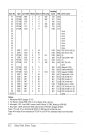
CMOS
Complementary Metal-Oxide Semiconductor. A method of
making low power silicon chips.
Code
A system of symbols for representing data or instructions. Also
any software program or part of a program.
Command
An instruction you enter (usually on a keyboard) to direct your
computer to perform a specific function.
Command prompt
The symbol or message that tells you MS-DOS is loaded and
ready to receive instructions. The default command prompt in
MS-DOS also displays the current operating drive; if it is drive A,
the command prompt looks like this: A >. See also Prompt.
Configuration
The particular setup of a group of components. For example, a
typical system configuration consists of a computer with one
diskette drive and one hard disk drive and a monitor, connected
to a printer.
Control code
A command (generated when you hold down
Ctrl
and press
another key on the keyboard) that instructs your computer to
perform a specific function.
Coprocessor
An optional device that enables the computer to process certain
mathematical calculations faster.
Copyprotected program
A type of program that cannot be copied. Some copy-protected
programs require you to leave the program diskette in the diskette
drive while you are using it. Some also require the computer to be
running at 8 MHz instead of 20 MHz.
Glossary 3


















